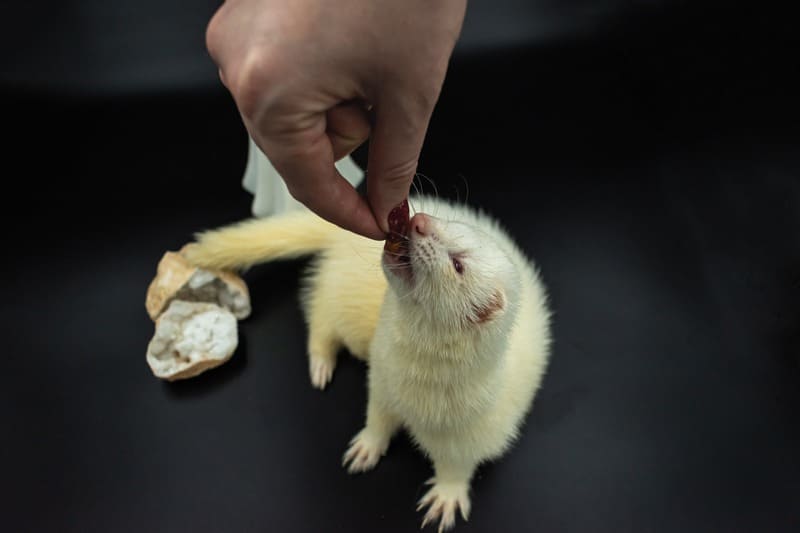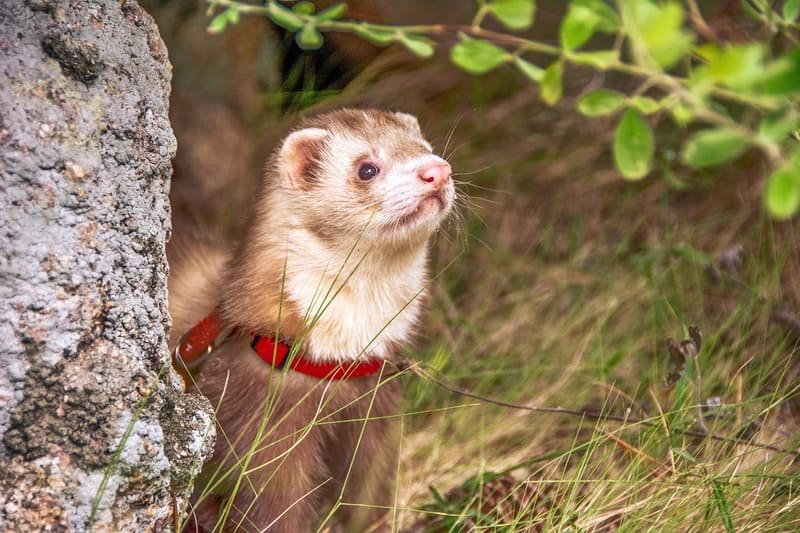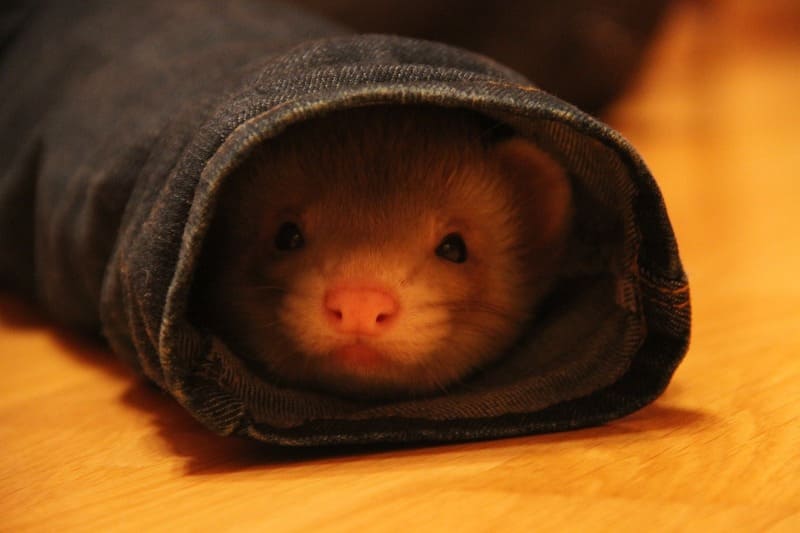Feeding your ferret a proper and balanced diet is essential for their health and well-being. While ferrets are obligate carnivores, meaning their diet primarily consists of meat, there are specific foods that you should never feed them. In this comprehensive guide, we’ll discuss what foods you should avoid giving to your ferret and provide insights into their dietary requirements for a happy and healthy pet.

Ferret Dietary Basics
Ferrets have specific dietary needs that are different from many other pets. Understanding their nutritional requirements is crucial for providing proper care. Here are some key aspects of a ferret’s diet:
1. High-Protein Diet
Ferrets are obligate carnivores, which means they require a diet primarily composed of animal-based protein. Protein should make up about 32-40% of their diet. Look for high-quality commercial ferret food with meat or poultry listed as the first ingredient.
2. Moderate Fat Intake
Ferrets need a diet with a moderate fat content, typically around 15-20%. The fat should come from animal sources rather than plant-based oils.
3. Low Carbohydrates
Ferrets have limited ability to digest carbohydrates. Their diet should be low in carbohydrates, with less than 3-5% of their food coming from carbohydrates.
4. Fresh Water
Ferrets require access to fresh water at all times. Ensure they have a clean and reliable source of water to prevent dehydration.
5. Small, Frequent Meals
Ferrets have fast metabolisms and need to eat frequently. Provide food in several small meals throughout the day to prevent hypoglycemia (low blood sugar).

Foods to Avoid
Now that you understand the basics of a ferret’s dietary requirements, let’s delve into the foods you should never feed your ferret:
1. Fruits and Vegetables
Ferrets are not equipped to digest fruits and vegetables effectively. They lack cecum, a pouch-like structure in the digestive tract that allows other animals to break down plant matter. Feeding fruits and vegetables can lead to digestive upset, including diarrhea and gastrointestinal issues. Avoid giving your ferret any form of produce, including apples, grapes, carrots, and leafy greens.
2. Dairy Products
Ferrets are lactose intolerant, which means they lack the enzyme necessary to digest lactose, the sugar found in milk and dairy products. Feeding dairy products can lead to gastrointestinal upset, diarrhea, and discomfort for your ferret. Keep all dairy items, including milk, cheese, and yogurt, out of their diet.
3. Dog or Cat Food
Ferrets have unique dietary requirements that differ from dogs and cats. While they are all carnivores, the nutritional composition of their diets is distinct. Feeding your ferret dog or cat food is not suitable for their health, as it often lacks the high protein and fat content that ferrets need.
4. Sugary Treats and Snacks
Sugary treats, candies, and snacks should never be given to ferrets. Ferrets are susceptible to insulinoma, a pancreatic tumor that affects blood sugar regulation. Excessive sugar can exacerbate this condition. To keep your ferret healthy, avoid offering sugary treats like chocolate, cookies, or other human snacks.
5. Chocolate and Caffeine
Chocolate and caffeine are toxic to ferrets and should be kept far away from them. These substances can lead to severe health issues, including vomiting, diarrhea, rapid heart rate, and even death. Be sure to store any items containing chocolate or caffeine safely out of reach.
6. Nuts and Seeds
Nuts and seeds can pose a choking hazard for ferrets due to their small size. Additionally, the fat content in many nuts can be too high for ferrets and lead to gastrointestinal issues. Avoid feeding your ferret any type of nuts or seeds.
7. Processed Foods
Processed foods like chips, cookies, and fast food should never be part of a ferret’s diet. These items are high in unhealthy fats, salt, and preservatives, which can be detrimental to their health. Stick to a diet consisting of high-quality ferret-specific food.
8. Bones
While bones are often recommended for other carnivorous pets like dogs, they are not suitable for ferrets. Ferrets have a delicate digestive system and can easily choke on bone fragments or suffer from gastrointestinal obstructions. Avoid giving your ferret any type of bones, whether cooked or raw.
9. Onions and Garlic
Onions and garlic contain compounds that can be toxic to ferrets. These ingredients can cause damage to a ferret’s red blood cells, leading to anemia and other health problems. Ensure that any food items you offer your ferret do not contain onions or garlic.
10. Raw Meat
While a meat-based diet is essential for ferrets, it’s generally recommended to avoid feeding them raw meat. Raw meat can carry bacteria and parasites that may harm your ferret. Stick to high-quality commercial ferret food or consult with your veterinarian if you want to incorporate raw food into their diet.

Harmful Human Foods
It’s important to recognize that many human foods, while not specifically listed here, can be harmful to ferrets. Items like spices, sauces, and seasonings are often not suitable for their delicate digestive systems. Always err on the side of caution and provide a diet that consists of commercial ferret food specifically formulated to meet their nutritional needs.
Dietary Diversity
While it’s crucial to know what foods to avoid, it’s equally important to ensure dietary diversity and provide a balanced diet for your ferret. High-quality commercial ferret food is designed to meet their nutritional needs. However, you can occasionally offer small amounts of cooked, lean meat as a treat, such as cooked chicken or turkey. When introducing new foods, do so gradually to monitor your ferret for any adverse reactions.
Signs of Dietary Problems
As a responsible ferret owner, it’s essential to be vigilant and aware of the signs of dietary problems or illness in your pet. If you notice any of the following signs, consult your veterinarian for guidance and treatment:
- Diarrhea: Loose or watery stools can indicate a dietary issue or illness.
- Vomiting: Frequent vomiting may be a sign of digestive problems.
- Lethargy: A lack of energy or enthusiasm can be a sign of underlying health issues.
- Weight Loss: A noticeable reduction in your ferret’s weight can be an indicator of problems with their diet.
- Changes in Appetite: A sudden loss of appetite or increased food consumption should be investigated.
- Abdominal Pain: Signs of abdominal discomfort or pain may include restlessness, arching of the back, or vocalizations.
- Skin or Fur Abnormalities: Skin problems or changes in fur quality can be related to dietary or health issues.
If you notice any of these signs, it’s crucial to seek prompt veterinary care to address the issue and ensure your ferret’s health.
Conclusion
Feeding your ferret a proper diet is a fundamental aspect of responsible pet ownership. Avoid giving your ferret foods that can harm their health, such as fruits, vegetables, dairy products, and processed foods. Stick to high-quality commercial ferret food that meets their specific nutritional requirements. Providing a balanced diet and monitoring your ferret for any signs of dietary problems will contribute to a happy and healthy life for your cherished pet. Remember that consulting with a veterinarian who specializes in ferret care is always a wise choice to ensure your ferret’s dietary needs are met.
